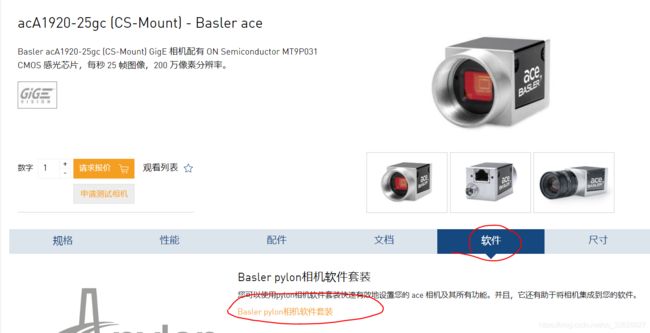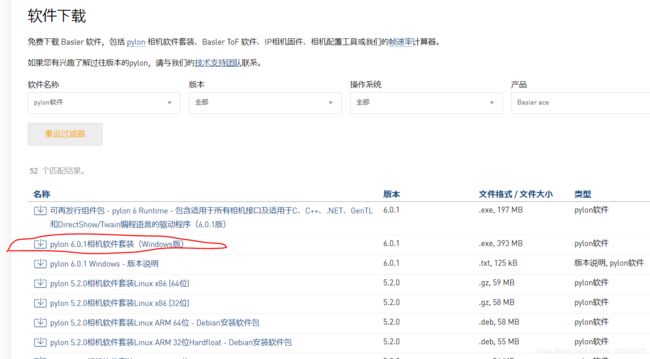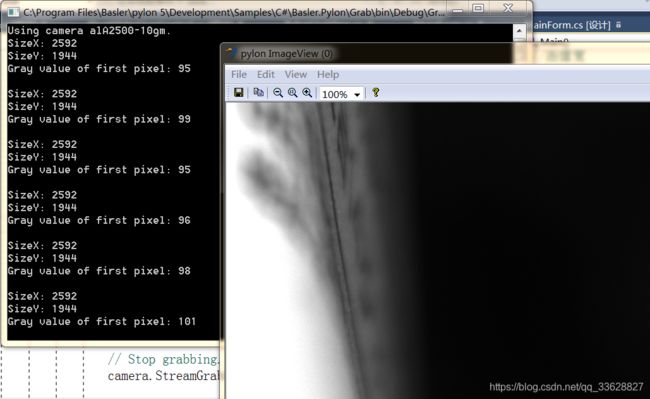Basler相机SDK开发
作为集成商,本着万事从官方开始的原则,先来到basler官网https://www.baslerweb.com/cn/
随便找一款相机,下载Basler pylon相机软件套装,下载pylon6.0.1相机软件套装(windows版本)
我这里用的是pylon5,一样的,安装的时候注意development装上,gige√上,usb√上
这里安装完软件,把手上的相机接到电脑上,首先要做的肯定是配置一下相机的IP等等之类的东西,不然你是连不上相机滴
具体怎么做见上一篇博客https://blog.csdn.net/qq_33628827/article/details/103857266
打开软件安装位置,选到basler/pylon/development/samples/C#/Basler.Pylon,双击打开pylon.NET.API.Samples.sln
这里我们只看其中的两个官方例子,一个是Grab,一个是PylonLiveView,这能满足我们基本的图像采集需求
下面是Grab项目代码分析
/*
This sample illustrates how to grab images and process images asynchronously.
This means that while the application is processing a buffer,
the acquisition of the next buffer is done in parallel.
The sample uses a pool of buffers. The buffers are automatically allocated. Once a buffer is filled
and ready for processing, the buffer is retrieved from the stream grabber as part of a grab
result. The grab result is processed and the buffer is passed back to the stream grabber by
disposing the grab result. The buffer is reused and refilled.
A buffer retrieved from the stream grabber as a grab result is not overwritten in the background
as long as the grab result is not disposed.
*/
using System;
using Basler.Pylon;
namespace Grab
{
class Grab
{
internal static void Main()
{
// The exit code of the sample application.
int exitCode = 0;
try
{
// Create a camera object that selects the first camera device found.
// More constructors are available for selecting a specific camera device.
//新建一个相机对象
using (Camera camera = new Camera())
{
// Print the model name of the camera.
Console.WriteLine("Using camera {0}.", camera.CameraInfo[CameraInfoKey.ModelName]);
// Set the acquisition mode to free running continuous acquisition when the camera is opened.
camera.CameraOpened += Configuration.AcquireContinuous;
// Open the connection to the camera device.
//打开相机
camera.Open();
// The parameter MaxNumBuffer can be used to control the amount of buffers
// allocated for grabbing. The default value of this parameter is 10.
//设置最大缓冲数,默认数值是10
camera.Parameters[PLCameraInstance.MaxNumBuffer].SetValue(5);
// Start grabbing.
//开始采集图像
camera.StreamGrabber.Start();
// Grab a number of images.
//工采集10帧图像
for (int i = 0; i < 10; ++i)
{
// Wait for an image and then retrieve it. A timeout of 5000 ms is used.
//采集结果,超时时间5000ms
IGrabResult grabResult = camera.StreamGrabber.RetrieveResult(5000, TimeoutHandling.ThrowException);
using (grabResult)
{
// Image grabbed successfully?
//判断是否采集成功
if (grabResult.GrabSucceeded)
{
// Access the image data.
Console.WriteLine("SizeX: {0}", grabResult.Width);//图像宽
Console.WriteLine("SizeY: {0}", grabResult.Height);//图像高
byte[] buffer = grabResult.PixelData as byte[];
//第一个像素的灰度值
Console.WriteLine("Gray value of first pixel: {0}", buffer[0]);
Console.WriteLine("");
// Display the grabbed image.
//显示图像
ImageWindow.DisplayImage(0, grabResult);
}
else
{
Console.WriteLine("Error: {0} {1}", grabResult.ErrorCode, grabResult.ErrorDescription);
}
}
}//end using
// Stop grabbing.
camera.StreamGrabber.Stop();
// Close the connection to the camera device.
camera.Close();
}
}
catch (Exception e)
{
Console.Error.WriteLine("Exception: {0}", e.Message);
exitCode = 1;
}
finally
{
// Comment the following two lines to disable waiting on exit.
Console.Error.WriteLine("\nPress enter to exit.");
Console.ReadLine();
}
Environment.Exit(exitCode);
}
}
}以上代码运行将连续采集10张图像,在控制台上打印每幅图像第一个点的灰度值,并且显示最后一张图像在baslerSDk自带的窗口上。
下面是PylonLive项目代码分析,这个是带有一个自带窗口,可实时采集与触发采集的例子
using System;
using System.Collections.Generic;
using System.ComponentModel;
using System.Data;
using System.Drawing;
using System.Drawing.Imaging;
using System.Text;
using System.Windows.Forms;
using System.Diagnostics;
using PylonLiveView;
using Basler.Pylon;
namespace PylonLiveView
{
// The main window.
public partial class MainForm : Form
{
private Camera camera = null;
//图像转换
private PixelDataConverter converter = new PixelDataConverter();
//测量时间
private Stopwatch stopWatch = new Stopwatch();
// Set up the controls and events to be used and update the device list.
public MainForm()
{
InitializeComponent();//初始化控件
// Set the default names for the controls.
//设置各个组合控件的名字
testImageControl.DefaultName = "Test Image Selector";
pixelFormatControl.DefaultName = "Pixel Format";
widthSliderControl.DefaultName = "Width";
heightSliderControl.DefaultName = "Height";
gainSliderControl.DefaultName = "Gain";
exposureTimeSliderControl.DefaultName = "Exposure Time";
// Update the list of available camera devices in the upper left area.
//更新相机设备信息
UpdateDeviceList();
// Disable all buttons.
EnableButtons(false, false);
}
// Occurs when the single frame acquisition button is clicked.
private void toolStripButtonOneShot_Click(object sender, EventArgs e)
{
OneShot(); // Start the grabbing of one image.
}
// Occurs when the continuous frame acquisition button is clicked.
private void toolStripButtonContinuousShot_Click(object sender, EventArgs e)
{
ContinuousShot(); // Start the grabbing of images until grabbing is stopped.
}
// Occurs when the stop frame acquisition button is clicked.
private void toolStripButtonStop_Click(object sender, EventArgs e)
{
Stop(); // Stop the grabbing of images.
}
// Occurs when a device with an opened connection is removed.
private void OnConnectionLost(Object sender, EventArgs e)
{
if (InvokeRequired)
{
// If called from a different thread, we must use the Invoke method to marshal the call to the proper thread.
BeginInvoke(new EventHandler(OnConnectionLost), sender, e);
return;
}
// Close the camera object.
DestroyCamera();
// Because one device is gone, the list needs to be updated.
UpdateDeviceList();
}
// Occurs when the connection to a camera device is opened.
private void OnCameraOpened(Object sender, EventArgs e)
{
if (InvokeRequired)
{
// If called from a different thread, we must use the Invoke method to marshal the call to the proper thread.
BeginInvoke(new EventHandler(OnCameraOpened), sender, e);
return;
}
// The image provider is ready to grab. Enable the grab buttons.
EnableButtons(true, false);
}
// Occurs when the connection to a camera device is closed.
private void OnCameraClosed(Object sender, EventArgs e)
{
if (InvokeRequired)
{
// If called from a different thread, we must use the Invoke method to marshal the call to the proper thread.
BeginInvoke(new EventHandler(OnCameraClosed), sender, e);
return;
}
// The camera connection is closed. Disable all buttons.
EnableButtons(false, false);
}
// Occurs when a camera starts grabbing.
private void OnGrabStarted(Object sender, EventArgs e)
{
if (InvokeRequired)
{
// If called from a different thread, we must use the Invoke method to marshal the call to the proper thread.
BeginInvoke(new EventHandler(OnGrabStarted), sender, e);
return;
}
// Reset the stopwatch used to reduce the amount of displayed images. The camera may acquire images faster than the images can be displayed.
stopWatch.Reset();
// Do not update the device list while grabbing to reduce jitter. Jitter may occur because the GUI thread is blocked for a short time when enumerating.
updateDeviceListTimer.Stop();
// The camera is grabbing. Disable the grab buttons. Enable the stop button.
EnableButtons(false, true);
}
// Occurs when an image has been acquired and is ready to be processed.
private void OnImageGrabbed(Object sender, ImageGrabbedEventArgs e)
{
//跨线程访问控件
if (InvokeRequired)
{
// If called from a different thread, we must use the Invoke method to marshal the call to the proper GUI thread.
// The grab result will be disposed after the event call. Clone the event arguments for marshaling to the GUI thread.
BeginInvoke(new EventHandler(OnImageGrabbed), sender, e.Clone());
return;
}
try
{
// Acquire the image from the camera. Only show the latest image. The camera may acquire images faster than the images can be displayed.
// Get the grab result.
IGrabResult grabResult = e.GrabResult;
// Check if the image can be displayed.
if (grabResult.IsValid)
{
// Reduce the number of displayed images to a reasonable amount if the camera is acquiring images very fast.
if (!stopWatch.IsRunning || stopWatch.ElapsedMilliseconds > 33)
{
stopWatch.Restart();
Bitmap bitmap = new Bitmap(grabResult.Width, grabResult.Height, PixelFormat.Format32bppRgb);
// Lock the bits of the bitmap.
BitmapData bmpData = bitmap.LockBits(new Rectangle(0, 0, bitmap.Width, bitmap.Height), ImageLockMode.ReadWrite, bitmap.PixelFormat);
// Place the pointer to the buffer of the bitmap.
converter.OutputPixelFormat = PixelType.BGRA8packed;
IntPtr ptrBmp = bmpData.Scan0;
converter.Convert(ptrBmp, bmpData.Stride * bitmap.Height, grabResult); //Exception handling TODO
bitmap.UnlockBits(bmpData);
// Assign a temporary variable to dispose the bitmap after assigning the new bitmap to the display control.
Bitmap bitmapOld = pictureBox.Image as Bitmap;
// Provide the display control with the new bitmap. This action automatically updates the display.
pictureBox.Image = bitmap;
if (bitmapOld != null)
{
// Dispose the bitmap.
bitmapOld.Dispose();
}
}
}
}
catch (Exception exception)
{
ShowException(exception);
}
finally
{
// Dispose the grab result if needed for returning it to the grab loop.
e.DisposeGrabResultIfClone();
}
}
// Occurs when a camera has stopped grabbing.
private void OnGrabStopped(Object sender, GrabStopEventArgs e)
{
if (InvokeRequired)
{
// If called from a different thread, we must use the Invoke method to marshal the call to the proper thread.
BeginInvoke(new EventHandler(OnGrabStopped), sender, e);
return;
}
// Reset the stopwatch.
stopWatch.Reset();
// Re-enable the updating of the device list.
updateDeviceListTimer.Start();
// The camera stopped grabbing. Enable the grab buttons. Disable the stop button.
EnableButtons(true, false);
// If the grabbed stop due to an error, display the error message.
if (e.Reason != GrabStopReason.UserRequest)
{
MessageBox.Show("A grab error occured:\n" + e.ErrorMessage, "Error", MessageBoxButtons.OK, MessageBoxIcon.Error);
}
}
// Helps to set the states of all buttons.
private void EnableButtons(bool canGrab, bool canStop)
{
toolStripButtonContinuousShot.Enabled = canGrab;
toolStripButtonOneShot.Enabled = canGrab;
toolStripButtonStop.Enabled = canStop;
}
// Stops the grabbing of images and handles exceptions.
private void Stop()
{
// Stop the grabbing.
try
{
camera.StreamGrabber.Stop();
}
catch (Exception exception)
{
ShowException(exception);
}
}
// Closes the camera object and handles exceptions.
private void DestroyCamera()
{
// Disable all parameter controls.
try
{
if (camera != null)
{
testImageControl.Parameter = null;
pixelFormatControl.Parameter = null;
widthSliderControl.Parameter = null;
heightSliderControl.Parameter = null;
gainSliderControl.Parameter = null;
exposureTimeSliderControl.Parameter = null;
}
}
catch (Exception exception)
{
ShowException(exception);
}
// Destroy the camera object.
try
{
if (camera != null)
{
camera.Close();
camera.Dispose();
camera = null;
}
}
catch (Exception exception)
{
ShowException(exception);
}
}
// Starts the grabbing of a single image and handles exceptions.
private void OneShot()
{
try
{
// Starts the grabbing of one image.
camera.Parameters[PLCamera.AcquisitionMode].SetValue(PLCamera.AcquisitionMode.SingleFrame);
camera.StreamGrabber.Start(1, GrabStrategy.OneByOne, GrabLoop.ProvidedByStreamGrabber);
}
catch (Exception exception)
{
ShowException(exception);
}
}
// Starts the continuous grabbing of images and handles exceptions.
private void ContinuousShot()
{
try
{
// Start the grabbing of images until grabbing is stopped.
camera.Parameters[PLCamera.AcquisitionMode].SetValue(PLCamera.AcquisitionMode.Continuous);
camera.StreamGrabber.Start(GrabStrategy.OneByOne, GrabLoop.ProvidedByStreamGrabber);
}
catch (Exception exception)
{
ShowException(exception);
}
}
// Updates the list of available camera devices.
private void UpdateDeviceList()
{
try
{
// Ask the camera finder for a list of camera devices.
//枚举电脑上的所有可用设备
List allCameras = CameraFinder.Enumerate();
//当前已存在的相机列表
ListView.ListViewItemCollection items = deviceListView.Items;
// Loop over all cameras found.
//循环所有可用的设备信息
foreach(ICameraInfo cameraInfo in allCameras)
{
// Loop over all cameras in the list of cameras.
bool newitem = true;
foreach(ListViewItem item in items)
{
ICameraInfo tag = item.Tag as ICameraInfo;
// Is the camera found already in the list of cameras?
//检查当前查找到的相机是否已在相机列表中
if (tag[CameraInfoKey.FullName] == cameraInfo[CameraInfoKey.FullName])
{
tag = cameraInfo;
newitem = false;
break;
}
}
// If the camera is not in the list, add it to the list.
//如果相机未在当前列表中添加到列表中
if (newitem)
{
// Create the item to display.
//创建一个Item,内容是当前相机的FriendlyName
ListViewItem item = new ListViewItem(cameraInfo[CameraInfoKey.FriendlyName]);
// Create the tool tip text.
string toolTipText = "";
foreach(KeyValuePair kvp in cameraInfo)
{
toolTipText += kvp.Key + ": " + kvp.Value + "\n";
}
item.ToolTipText = toolTipText;
// Store the camera info in the displayed item.
item.Tag = cameraInfo;
// Attach the device data.
//把Item添加到List中
deviceListView.Items.Add(item);
}
}
// Remove old camera devices that have been disconnected.
//从相机列表中移除不存在的相机
foreach(ListViewItem item in items)
{
bool exists = false;
// For each camera in the list, check whether it can be found by enumeration.
foreach(ICameraInfo cameraInfo in allCameras)
{
if (((ICameraInfo)item.Tag)[CameraInfoKey.FullName] == cameraInfo[CameraInfoKey.FullName])
{
exists = true;
break;
}
}
// If the camera has not been found, remove it from the list view.
if (!exists)
{
deviceListView.Items.Remove(item);
}
}
}
catch (Exception exception)
{
ShowException(exception);
}
}
// Shows exceptions in a message box.
private void ShowException(Exception exception)
{
//发生错误信息时弹出一个MessageBox提示错误信息
MessageBox.Show("Exception caught:\n" + exception.Message, "Error", MessageBoxButtons.OK, MessageBoxIcon.Error);
}
// Closes the camera object when the window is closed.
private void MainForm_FormClosing(object sender, FormClosingEventArgs ev)
{
// Close the camera object.
//关闭相机,释放相机资源,这一步是必须的,如果关闭程序没有执行这一步,相机将一直处于被占用状态
DestroyCamera();
}
// Occurs when a new camera has been selected in the list. Destroys the object of the currently opened camera device and
// creates a new object for the selected camera device. After that, the connection to the selected camera device is opened.
private void deviceListView_SelectedIndexChanged(object sender, EventArgs ev)
{
// Destroy the old camera object.
if (camera != null)
{
DestroyCamera();
}
// Open the connection to the selected camera device.
if (deviceListView.SelectedItems.Count > 0)
{
// Get the first selected item.
ListViewItem item = deviceListView.SelectedItems[0];
// Get the attached device data.
ICameraInfo selectedCamera = item.Tag as ICameraInfo;
try
{
// Create a new camera object.
camera = new Camera(selectedCamera);
camera.CameraOpened += Configuration.AcquireContinuous;
// Register for the events of the image provider needed for proper operation.
//对相机注册相应的事件处理函数
camera.ConnectionLost += OnConnectionLost;
camera.CameraOpened += OnCameraOpened;
camera.CameraClosed += OnCameraClosed;
camera.StreamGrabber.GrabStarted += OnGrabStarted;
camera.StreamGrabber.ImageGrabbed += OnImageGrabbed;//采集图像处理函数,当调用camera.StreamGrabber.Start函数的时候会触发
camera.StreamGrabber.GrabStopped += OnGrabStopped;
// Open the connection to the camera device.
camera.Open();
// Set the parameter for the controls.
testImageControl.Parameter = camera.Parameters[PLCamera.TestImageSelector];
pixelFormatControl.Parameter = camera.Parameters[PLCamera.PixelFormat];
widthSliderControl.Parameter = camera.Parameters[PLCamera.Width];
heightSliderControl.Parameter = camera.Parameters[PLCamera.Height];
if (camera.Parameters.Contains(PLCamera.GainAbs))
{
gainSliderControl.Parameter = camera.Parameters[PLCamera.GainAbs];
}
else
{
gainSliderControl.Parameter = camera.Parameters[PLCamera.Gain];
}
if (camera.Parameters.Contains(PLCamera.ExposureTimeAbs))
{
exposureTimeSliderControl.Parameter = camera.Parameters[PLCamera.ExposureTimeAbs];
}
else
{
exposureTimeSliderControl.Parameter = camera.Parameters[PLCamera.ExposureTime];
}
}
catch (Exception exception)
{
ShowException(exception);
}
}
}
// If the F5 key has been pressed, update the list of devices.
private void deviceListView_KeyDown(object sender, KeyEventArgs ev)
{
if (ev.KeyCode == Keys.F5)
{
ev.Handled = true;
// Update the list of available camera devices.
UpdateDeviceList();
}
}
// Timer callback used to periodically check whether displayed camera devices are still attached to the PC.
private void updateDeviceListTimer_Tick(object sender, EventArgs e)
{
UpdateDeviceList();
}
}
}
所有搜索到的相机显示在列表框中,三个按钮分别控制列表框中被选中相机的单张采集,连续采集,停止采集图像,并且可以设置增益,曝光时间等参数
以上是官方的例程,仅仅是展示了相机的使用方式,但感觉跟我们的面向对象编程格格不入。下面是我封装的相机SDK类,内部已把图像装换成Halcon的图像格式HImage。添加到自己的项目中可以直接使用,其原理与以上介绍的第一个例程是完全一样的。
using System;
using System.Collections.Generic;
using System.Linq;
using System.Text;
using System.Threading.Tasks;
using System.Runtime.InteropServices;
using Basler.Pylon;
using HalconDotNet;
namespace BaslerSdk
{
class BaslerClass
{
List allCameras = null;//ICameraInfo对象的列表,用于保存遍历到的所有相机信息
Camera myCamera = null;//相机对象
HImage image = null;
//构造函数
public BaslerClass()
{
}
public int connectCamera(string id)//连接相机,通过相机ID找到对应的相机并打开。返回-1为失败,0为成功
{
allCameras = CameraFinder.Enumerate();//获取所有相机设备
for (int i = 0; i < allCameras.Count; i++)
{
try
{
if (allCameras[i][CameraInfoKey.SerialNumber] == id)
{
//如果当前相机信息中序列号是指定的序列号,则实例化相机类
myCamera = new Camera(allCameras[i]);
myCamera.Open();//打开相机
return 0;
}
continue;
}
catch
{
return -1;
}
}
return -1;
}
public int startCamera()//相机开始采集,返回-1为失败,0为成功
{
try
{
myCamera.StreamGrabber.Start();
}
catch
{
return -1;
}
return 0;
}
public int stopCamera()//停止相机采集,返回-1为失败,1为成功
{
try
{
myCamera.StreamGrabber.Stop();
}
catch
{
return -1;
}
return 0;
}
public int closeCamera()//关闭相机,返回-1为失败,1为成功
{
try
{
myCamera.Close();
}
catch
{
return -1;
}
return 0;
}
public int softTrigger()//发送软触发命令
{
try
{
myCamera.ExecuteSoftwareTrigger();
}
catch
{
return -1;
}
return 0;
}
public HImage ReadBuffer()//读取相机buffer并转换成Halcon HImage格式的图像
{
if (myCamera == null)
{
return null;
}
IGrabResult grabResult = myCamera.StreamGrabber.RetrieveResult(4000, TimeoutHandling.ThrowException);//读取buffer,超时时间为4000ms
image = new HImage();
using (grabResult)
{
if (grabResult.GrabSucceeded)
{
if (IsMonoData(grabResult))
{
//如果是黑白图像,则利用GenImage1算子生成黑白图像
byte[] buffer = grabResult.PixelData as byte[];
IntPtr p = Marshal.UnsafeAddrOfPinnedArrayElement(buffer, 0);
image.GenImage1("byte", grabResult.Width, grabResult.Height, p);
}
else
{
if (grabResult.PixelTypeValue != PixelType.RGB8packed)
{
//如果图像不是RGB8格式,则将图像转换为RGB8,然后生成彩色图像
//因为GenImageInterleaved算子能够生成的图像的数据,常见的格式只有RGB8
//如果采集的图像是RGB8则不需转换,具体生成图像方法请自行测试编写。
byte[] buffer_rgb = new byte[grabResult.Width * grabResult.Height * 3];
Basler.Pylon.PixelDataConverter convert = new PixelDataConverter();
convert.OutputPixelFormat = PixelType.RGB8packed;
convert.Convert(buffer_rgb, grabResult);
IntPtr p = Marshal.UnsafeAddrOfPinnedArrayElement(buffer_rgb, 0);
image.GenImageInterleaved(p, "rgb", grabResult.Width, grabResult.Height, 0, "byte", grabResult.Width, grabResult.Height, 0, 0, -1, 0);
}
}
return image;
}
else
{
return null;
}
}
}
public int setExposureTime(long ExposureTimeNum)//设置曝光时间us
{
try
{
myCamera.Parameters[PLCamera.ExposureTimeAbs].SetValue(ExposureTimeNum);
}
catch
{
return -1;
}
return 0;
}
public int pixelFormat(uint pixelType)//设置图像格式,黑白相机的只能设置成黑白图像
{
//1:Mono8 2:彩色YUV422
try
{
if (pixelType == 1)
{
myCamera.Parameters[PLCamera.PixelFormat].TrySetValue(PLCamera.PixelFormat.Mono8);
}
else if (pixelType == 2)
{
myCamera.Parameters[PLCamera.PixelFormat].TrySetValue(PLCamera.PixelFormat.YUV422Packed);
}
}
catch
{
return -1;
}
return 0;
}
public int setHeight(long height)//设置图像高度,数值不要超过相机的分辨率
{
try
{
if (myCamera.Parameters[PLCamera.Height].TrySetValue(height))
return 0;
else
return -1;
}
catch
{
return -1;
}
}
public int setWidth(long width)//设置图像宽度,数值不要超过相机的分辨率
{
try
{
if (myCamera.Parameters[PLCamera.Width].TrySetValue(width))
return 0;
else
return -1;
}
catch
{
return -1;
}
}
public int setOffsetX(long offsetX)//设置图像水平偏移
{
try
{
if (myCamera.Parameters[PLCamera.OffsetX].TrySetValue(offsetX))
return 0;
else
return -1;
}
catch
{
return -1;
}
}
public int setOffsetY(long offsetY)//设置图像竖直偏移
{
try
{
if (myCamera.Parameters[PLCamera.OffsetY].TrySetValue(offsetY))
return 0;
else
return -1;
}
catch
{
return -1;
}
}
public int setTriggerMode(uint TriggerModeNum)//设置触发模式开关
{
//1:为On 触发模式
//0:Off 连续模式
try
{
if (myCamera.Parameters[PLCamera.TriggerMode].TrySetValue(TriggerModeNum == 1 ? "On" : "Off"))
return 0;
else
return -1;
}
catch
{
return -1;
}
}
public int closeBalanceAuto()//关闭自动白平衡
{
try
{
myCamera.Parameters[PLCamera.BalanceWhiteAuto].TrySetValue("Off");
}
catch
{
return -1;
}
return 0;
}
public int setSoftTrigger()//设置软触发
{
try
{
if (myCamera.Parameters[PLCamera.TriggerSource].TrySetValue("Software"))//设置为软触发
return 0;
else
return -1;
}
catch
{
return -1;
}
}
private Boolean IsMonoData(IGrabResult iGrabResult)//判断图像是否为黑白格式
{
switch (iGrabResult.PixelTypeValue)
{
case PixelType.Mono1packed:
case PixelType.Mono2packed:
case PixelType.Mono4packed:
case PixelType.Mono8:
case PixelType.Mono8signed:
case PixelType.Mono10:
case PixelType.Mono10p:
case PixelType.Mono10packed:
case PixelType.Mono12:
case PixelType.Mono12p:
case PixelType.Mono12packed:
case PixelType.Mono16:
return true;
default:
return false;
}
}
public void DestroyCamera()
{
// Disable all parameter controls.
if (myCamera != null)
{
myCamera.Close();
myCamera.Dispose();
myCamera = null;
}
}
}
}
下面的代码是调用的上面自己封装的类采集并处理图像的例子,要运行的话需要在窗口上拖几个按钮和一个Halcon窗口
using System;
using System.Collections.Generic;
using System.ComponentModel;
using System.Data;
using System.Drawing;
using System.Linq;
using System.Text;
using System.Threading.Tasks;
using System.Windows.Forms;
using HalconDotNet;
using Basler.Pylon;
namespace BaslerSdk
{
public partial class BaslerSdk : Form
{
HWindow hWin;
HImage hImage;
BaslerClass camera;
public BaslerSdk()
{
InitializeComponent();
hWin = hWindowControl1.HalconWindow;//窗口句柄,使用窗口显示图像
hImage = new HImage();
List allCameras = CameraFinder.Enumerate();//获取所有相机设备
if (allCameras.Count == 0)
{
return;
}
for (int i = 0; i < allCameras.Count; i++)
{
this.comboBox1.Items.Add(allCameras[i][CameraInfoKey.SerialNumber]);
}
camera = new BaslerClass();
camera.connectCamera(allCameras[0][CameraInfoKey.SerialNumber].ToString());
}
///采集图像
private void button1_Click(object sender, EventArgs e)
{
camera.startCamera();
hImage = camera.ReadBuffer();
hWin.DispImage(hImage);
camera.stopCamera();
}
///对图像处理
private void button2_Click(object sender, EventArgs e)
{
HOperatorSet.Threshold(hImage, out HObject ThreshRegion, 0, 50);
hWin.DispObj(ThreshRegion);
}
///保存图像
private void button3_Click(object sender, EventArgs e)
{
}
///程序关闭时释放相机,让其他程序能正常使用相机
private void BaslerSdk_FormClosing(object sender, FormClosingEventArgs e)
{
if (camera == null)
{
return;
}
camera.DestroyCamera();
}
}
}


